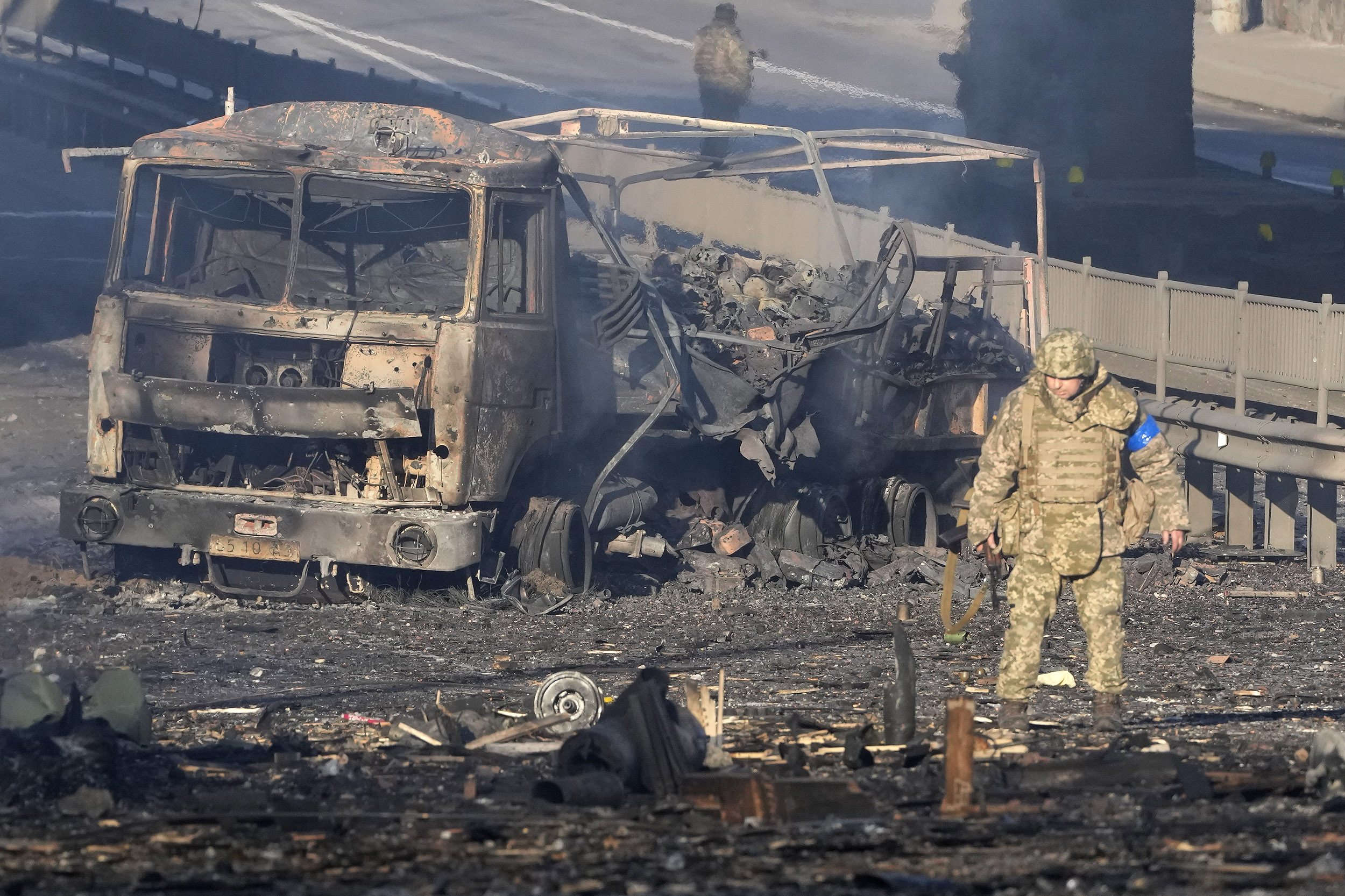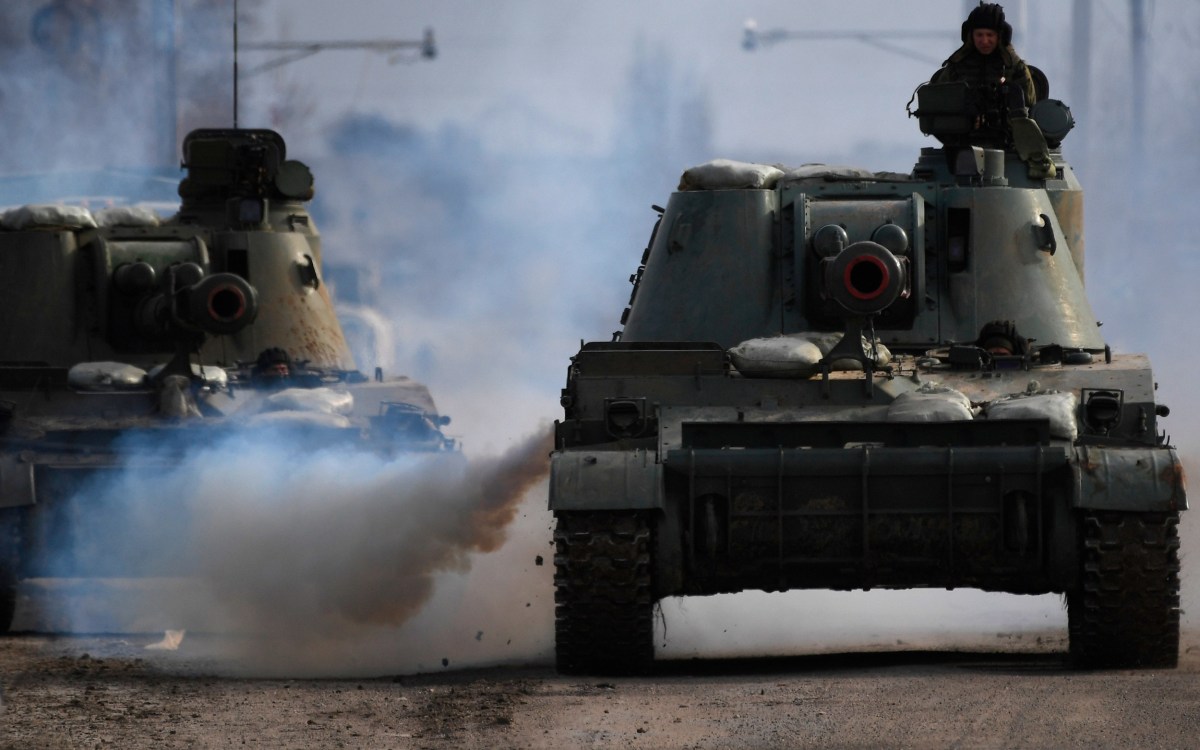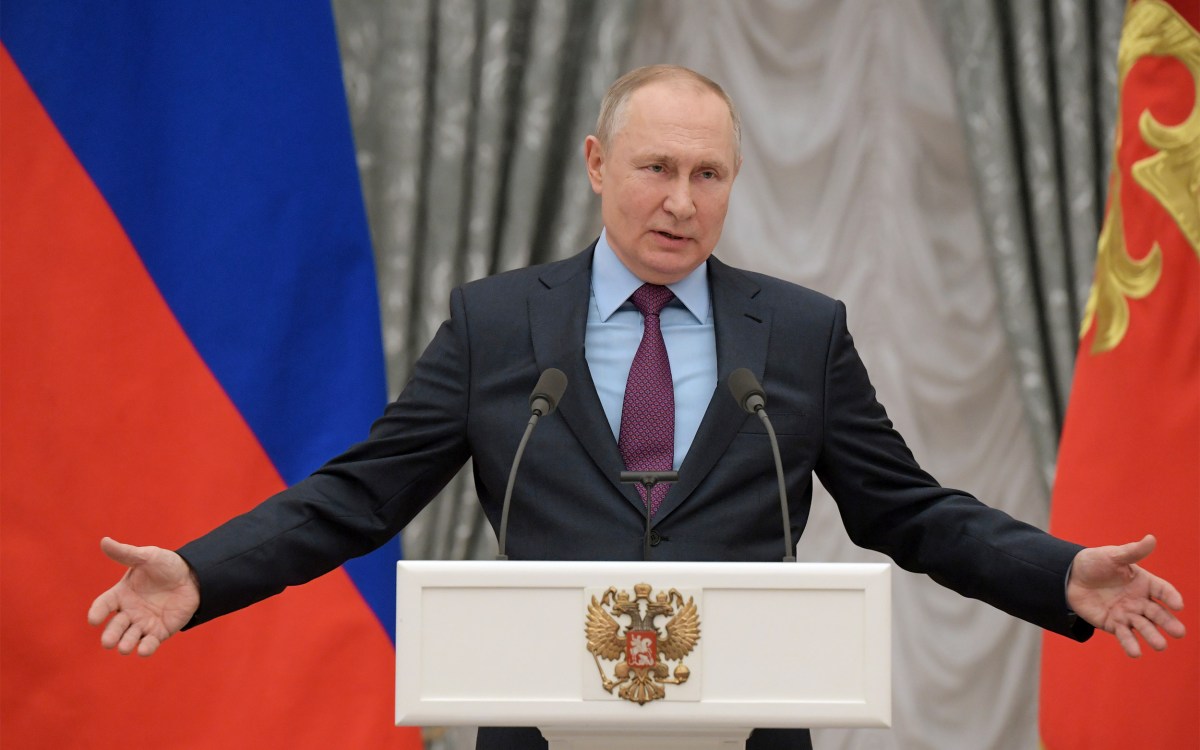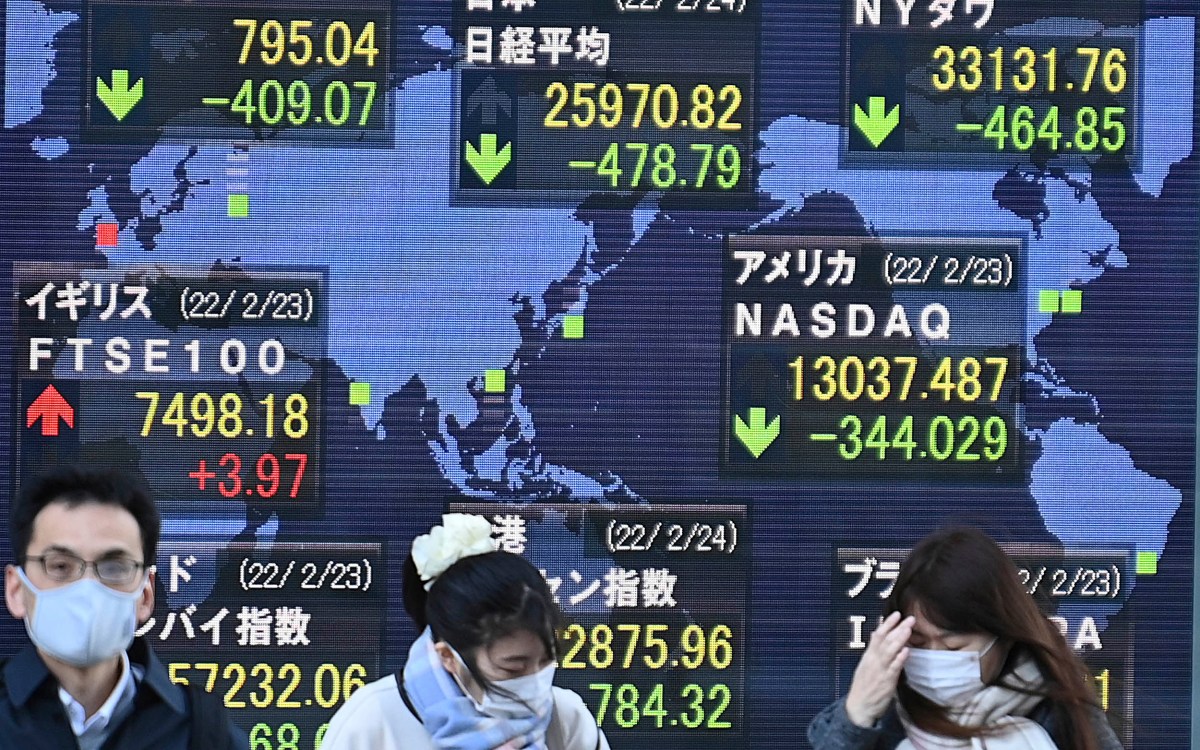
Fierce street fighting erupted Saturday as Russian troops advanced on Kyiv, Ukraine’s capital.
AP Photo/Efrem Lukatsky
Ukraine stands firm, but so does Putin’s inner circle
Expert assesses unfolding conflict, including nuclear tensions, step toward negotiations, influence of oligarchs
The five-day-old war in Ukraine is shifting rapidly, with Ukrainian fighters slowing the Russian advance into major cities, international condemnation and sanctions mounting, and more than 300,000 Ukrainians leaving the country. Alexandra Vacroux, the executive director of Harvard’s Davis Center for Russian and Eurasian Studies, has been following the crisis moment to moment. She spoke to the Gazette on Sunday. The interview has been edited for clarity and length.
Q&A
Alexandra Vacroux
GAZETTE: Ukraine has agreed to talks with Russia. What does that tell us about the Zelensky government’s assessment of the situation?
VACROUX: Ukraine has said from the beginning that they’re willing to talk, but that they didn’t want to do it in Minsk — which is where Russia had proposed — given that Russia is sending troops through Belarus. My understanding is that now they’re going to meet on the border between Belarus and Ukraine. It’s a good sign. That is the way this conflict is going to end, sooner or later. This situation can be negotiated, but it can’t be negotiated in a way where Ukraine gives up sovereignty, which I think is ultimately what the Russians want. It’s always good to be talking, but I would be surprised if this could get resolved in a couple of days over the negotiating table, especially while the Russians are still attacking.
GAZETTE: Do you think Russia would settle for anything short of regime change?
VACROUX: I don’t think so. I think their objective is control over Ukraine. They tried to do it indirectly through pro-Russian politicians, and that didn’t work. Now they’re taking direct action to be sure that the person running Ukraine is going to be friendly. I don’t think that they’ve fully taken onboard the unlikelihood that the Ukrainians are going to accept a Russian puppet. That’s really hard to do if you’ve been a democracy.
GAZETTE: Russia put its nuclear forces on alert in response to sanctions on Sunday. Is that a credible threat?
VACROUX: I don’t think he’s about to launch, if that’s the question. The Russians have always taken into account their nuclear weapons in their military planning and in their strategy, much more so than the United States. The United States assumes we would not use them. They’re a deterrent, they’re in the plans, but they’re not top of mind. I was once in Moscow at a meeting and we were talking to someone who was involved in their missile program. He asked a retired American general, “How do you guys think about your nuclear weapons?” And the American said, “Well, we really never think about them at all.” And the Russian said, “That’s interesting, because we think about them every day.” It’s not that they’re reckless about using them — they understand as well as we do how serious they are — but it’s part of the calculus. And I don’t think that we were expecting this as the logical response to sanctions and aggressive statements. At least I wasn’t.
GAZETTE: Is this a sign that the sanctions and global support for Ukraine are working?
VACROUX: Putin doesn’t have many options to continue saber rattling, and this certainly gets everyone’s attention. He seems to have a pretty serious problem on his hands, though. We’re anticipating a bank run Monday morning because everybody wants to get cash. The central bank has said that they’re going to be providing liquidity to all of the Russian banks, presumably so the ATMs don’t run dry. But if there’s any kind of panic on the streets, that would be very, very bad for him.
“My main concern is that you not get uncontrolled escalation — the Russians do something that that affects a NATO country and there’s a feeling that we have to respond with an attack.”
GAZETTE: Should the world be surprised that ordinary Ukrainians are so willing to fight against such long odds?
VACROUX: I try to imagine if this would happen in the United States and for sure, some people would take up arms. I don’t think schoolteachers would, nor would 60-year-olds who have never held a gun. But the culture, at least in the former Soviet Union, is much more military-conscious than we are in the West. And even though that generation is getting older — the Soviet Union collapsed 30 years ago — there’s still a sense of the importance of the military and the importance of defending your motherland. It’s not that there’s more patriotism, but it’s a more active patriotism, in part because Ukraine is in a global neighborhood where that really matters. Certainly since 2014, when Russia annexed Crimea, attitudes in Ukraine toward Russia have changed significantly. Even people who were pro-Russian and Russian speakers, like Zelensky, became much more apprehensive about what it meant to be Russia’s neighbor. What we have seen is not a change one week to the next — now people are going to pick up a rifle and start shooting Russians — but eight years of a slowly building sense that Russia does not want to be a benevolent neighbor.
GAZETTE: The odds of Ukraine holding off Russia appear to be long. Have you been surprised by the early success of the country’s resistance, particularly in Kyiv, Kharkiv, and Kherson?
VACROUX: I think everyone’s been surprised — surprised and impressed. At the same time, it took nine months for the Americans to take Mosul. The Germans never managed to take Moscow. So it’s possible to resist but it takes a tremendous amount of will, which is something that the Ukrainians have an ample supply of, unlike the Russian soldiers who are kind of miserable, undersupplied, and didn’t necessarily know where they were being sent. They have probably been sleeping in a tent for six weeks and the logistical side of the Russian maneuvers doesn’t seem to be going very well. It’s terrible what they’re doing, but so far the Russians have, to a degree, been professionally restrained and have largely avoided indiscriminate civilian targets. They haven’t really put everything they could into taking those cities because doing so would require, basically, atrocities, and I don’t know if they’re willing to go there. Even if they do take those cities, it’s very hard to pacify a population of 44 million with 200,000 troops. You might have 50,000 policemen to keep things in order on a regular day — how are you going to be able to hold Kyiv with a fraction of that? It’s just not possible. We could be looking at a long and very protracted insurgency. I certainly wouldn’t expect the Ukrainians to give up.
GAZETTE: How big a danger is unrest at home for Putin?
VACROUX: That’s the question we’re all asking ourselves. We don’t have any polling data, so we don’t know if people are supporting this war — we don’t even know if they would say that they aren’t if they were polled. What we can see are some pretty big street demonstrations in a country where it’s dangerous to go out on the street and demonstrate. That’s important. We also see that two oligarchs — Mikhail Fridman and Oleg Deripaska — have said that the war should be ended as fast as possible. That’s pretty significant. Usually authoritarian regimes don’t end through mass protest but through fragmentation of the elite and, until now, we’ve seen none of that. The political elites seem to be holding together, but the fact that these two oligarchs have come out against the party line is quite important. We’ll have to see if others follow and if that puts any kind of pressure on Putin. Right now, I don’t think it will. I think it will get them in trouble, whatever that means. But sometimes these regimes can fall much, much faster than you think.
GAZETTE: Two oligarchs are talking. Any idea how many are thinking the same thing but not talking?
VACROUX: I would guess that most of them are thinking the same thing and not talking, but there’s no way to know. And the oligarchs aren’t everyone. The inner political circle is more important than the oligarchs for Putin. He doesn’t need many people to feel like he’s controlling the country. That inner circle of maybe six people, they’re the main ones and I don’t see them defecting.
GAZETTE: What are you going to be looking for over the next couple of days?
VACROUX: I’m definitely following this higher level of nuclear posture. That’s extremely worrisome. We’re still looking carefully to see if there are going to be cyberattacks. Anonymous has said that they’re working against Russia now and hopefully that’s public enough and nongovernmental enough — I’ve no idea who they are — that it’s not taken as a Western attack on Russia. My main concern is that you not get uncontrolled escalation — the Russians do something that that affects a NATO country and there’s a feeling that we have to respond with an attack. The potential for unintended consequences goes way up. The other thing that we’ll look at, of course, is the negotiations. If Russia were willing to turn around and go home, which I doubt, that would be very significant.
GAZETTE: Is it likely Putin would survive domestically if he does that?
VACROUX: I don’t know. I don’t think that you would necessarily have mass demonstrations, but it might be that the show of weakness and miscalculation might lead the elite to defect. But as I said, we haven’t really seen any cracks in the political elite yet.








